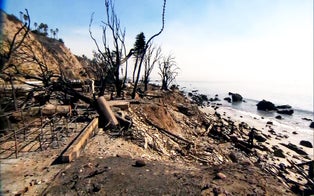What happens to sex offenders after they've served their prison sentence? INSIDE EDITION reports from Sex Offender Island, which houses convicted sex offenders who are deemed likely to commit violent crimes again.
It's one of the most controversial and bizarre communities in America, where sex predators live on an island and most are never allowed to leave.
INSIDE EDITION went to to McNeil island which is about an hour outside of Seattle. It houses 280 violent sex offenders. The only way on or off the island is by ferry. The trip started with a strict search of all bags at the ferry dock. Then, security is so tight, INSIDE EDITION was told to turn off its cameras along the ferry route.
INSIDE EDITION arrived at what's known as Sex Offender Island, and it's like a modern day Alcatraz. But this is not a prison. Instead, it's a treatment center where sex offenders who've already served their prison sentence, are sent and detained indefinitely because they are considered likely to attack again.
Assistant superintendent Kathy Harris lead us on a tour of the facility, which, surprisingly, looks a lot like a college campus. Sexual predators walk freely to and from classes and live in private dorm rooms.
Believe it or not, at this treatment facility, even though these sex offenders are considered violent, the guards do not carry guns. In fact, they don't carry any weapons. Instead the facility relies on razor sharp fencing and 200 security cameras to maintain order.
INSIDE EDITION's Lisa Guerrero met Richard Kurtis, responsible for a string of horrific crimes. Guerrero asked Kurtis why he is on the island.
"I've been found to be a sexually violent predator," said Kurtis.
"So you raped someone," said Guerrero.
"Yes, I have one first degree rape, I have 2 others first degree rapes that were dropped, second degree assault and I have 9 victims that were unreported," said Kurtis.
It's a chilling admission. But Kurtis tells INSIDE EDITION he's rehabilitated because of therapy on the island and says he should be allowed to leave.
"There are assignments I do that are in the blue book. I've completed almost all of them. I'm rewriting my relapse prevention plan," said Kurtis.
He says he's learned to control his demons but seconds later, what he says is shocking.
Guerrero asked, "You are willing to tell me that when you get out, if I live next door to you, there is not a one percent chance that you would ever hurt me?"
"I can't say that," said Kurtis.
"Then that's scary," said Guerrero.
"Now wait a minute, wait a minute. We don't have no crystal ball here," said Kurtis.
Kurtis participates in sex offender therapy but surprisingly most men on this island do not. That's because it's their choice.
Guerrero asked Dennis Breedlove, "Tell me why you are here."
"I'm here because the state deemed me one of the worst of the worst of the sexually violent predators," said Breedlove, who spends most of his time taking computer classes but chose not to enroll in the treatment program.
"How do you feel about being here," asked Guerrero.
"I imagine it would be considered necessary for the protection of the community," said Breedlove.
But other sex offenders here argue that being detained on the island indefinitely is a violation of their rights.
Richard Scott was convicted of child rape. He served time in prison before being sent to Sex Offender Island. He hopes to one day leave, but the odds are against him. Only four people have ever been unconditionally released back into society.
'You can't increase a person's punishment when they've done the maximum amount of time for the crime," said Scott.
Guerrero asked superintendent Kelly Cunningham, "Do you think these guys can be cured?"
Kelly said, "Through treatment they're addressing their issues, their risk is being reduced, but nobody's claiming a cure for sex offending."
It costs $160,000 to house one resident per year. 18 other states have a program like this one in Washington that detains sex offenders after they've served prison time.





